![]()
Poverty Line and Inflation Control in Iran
The editorial of Setareh Sobh addresses the issue of poverty line and inflation in Iran, as well as the measures that need to be taken by the government to control the worsening economic situation in the country.
Iranian parliament’s research center has published a report, saying poverty line in the country is below three million tomans per month. It should be noted however that publishing economic reports and statistics is the responsibility of the Statistical Center of Iran, Central Bank of Iran, Ministry of Labor and Social Affairs and the government. Unfortunately, those institutions either have neglected this task or lack the courage to reveal statistics about current economic conditions.
Given Iran’s economic crisis during past months, the statistics regarding poverty line reported by the parliament’s research center is hardly logical. However, if poverty line is actually below three million tomans per month, the government needs to take short-term and long-term measures to make life easier for the lower class in society. Most of salaried employees live under poverty line. If the government decides to raise wages, it should borrow from the Central Bank—which will lead to intensifying inflation.
Therefore, the government should first curb inflation and soaring prices. Besides, it should provide people with non-monetary aids, such as supplying them with a monthly basket of essential goods, granting them loans for rent, as well as covering their medical expenses. If the government avoids making fundamental reforms, economic crisis will continue next year. Then it will be too late to tackle such hurdles.
Setareh Sobh—December 12
Overseas Persian-Speaking TV Networks Indebted to IRIB!
The editorial of Arman Emrooz focuses on how censorship in Iran state-run TV (IRIB) has made Iranian people turn to overseas Persian TV networks for accessing reliable news.
Satellite Persian-speaking networks, the editorial urges, are mostly indebted to IRIB, because it is the national media’s programs have made these networks popular in Iran. IRIB acts as if people have no political sense. As an example, one can point to censoring the speech of Ali Motahari, deputy to Parliament Speaker, in the program called “Now the Sun”.
The editorial goes on to say: IRIB thinks its audience would listen to whatever it says, would do whatever it says, and would accept whatever is said on this media. They must know that people wouldn’t believe what they say without researching it. IRIB has lost credibility even among the most traditional groups within the society. Even hardline principlists, for example, cite quotations from BBC Persian to support their own ideas. This means that principlists too follow the news from overseas Persian-speaking networks and are influenced by it.
The editorial concludes: it must be admitted that overseas Persian-speaking networks owe their popularity to IRIB’s behaviors. If IRIB broadcasted programs that would respect the audiences’ intelligence, then no one would turn to these Persian-speaking networks.
Arman Emrooz – December 12
Is There Resolve to Confront Corruption?
The editorial of Jahan Sanat asks if there is any resolve to confront and fight widespread corruption in Iran.
According to the editorial, a forum about corruption in the country was held in Tehran University, in which some lawmakers, economists and sociologists took part. The most important question in the forum was whether corruption is occasional or systematic. Most of speakers urged that high volume of corruption in different parts of the country is a sign of its being systematic in Iran. Some solutions were suggested as well.
It seems that, the editorial continues, what connects all these solutions is the issue of resolve: is there really a resolve to confront corruption? This is not just related to the government-establishment. There must be a social demand – not just daily complaints, but in the form of a strong social movement. The problem with fighting corruption in Iran is that it hasn’t gone beyond holding forums or political disputes.
The editorial adds: on the government level, the issue is mostly related to structural characteristics of government in Iran. The government is based on rent-seeking, is nonproductive, doesn’t rely on any particular party, and doesn’t have a clear social base. As such, power is the domain for giving concessions to supporters and proponents.
A part of the society, the editorial concludes, benefits from this situation. As a result, they are allied with the government, i.e. they close their eyes to each other’s corruption. In so far as governmental-social resolve is not formed in the real sense of the word, there will not be any sign of fight with real corruption.
Jahan Sanat – December 12
Cheap Prices, Some Other Time, Perhaps!
The editorial of Tejarat focuses on the issue of high prices and how Iranian people can only dream of prices seriously going down.
Iranian President announced that if ‘we are after cheaper prices, we must accept FATF, or else we must expect rise in prices,’ predicting 20% drop in prices. Now the question is what causes the rise in prices. Today there are no goods whose price has risen less than 50%. What is more unfortunate is that prices of many goods have had 300% growth or even more.
The editorial continues: if we go over the election slogans, we can see that there is a huge difference between what can be observed today in the country’s economy with what Rouhani promised during his election campaign. His famous slogan was: ‘we will create such an economic prosperity that people will not need to receive cash subsidies.’
It has been a while, the editorial adds, that cheap price has become just a dream for Iranian people. From essential to luxury goods, the prices are on the rise. It seems that people have become forgetful. When the price of dollar reached 20,000 tomans and then started to go down, people started talking of dollar price becoming cheap. They do not remember that dollar was 3500 tomans initially. The prices of many goods were so low that after the rise in prices, they now look like a dream.
The editorial concludes: what is the worst is that we have all forgotten the cheap prices and high prices have become habitual for us. If today the price of goods rises a little, we will rush to stores to buy and hoard them at homes.
Tejarat – December 11
Mr. President, Reconsider Your Cabinet!
The editorial of Jomhouri Eslami newspaper asks Iranian President to reconsider his cabinet members and appoint those who are determined to resolve people’s livelihood problems.
According to the editorial, continuation of high prices seems like a never-ending story in Iran. On the one hand, people show no mercies towards each other. And on the other hand, government organizations add fuel to the problems, instead of controlling the prices.
The editorial continues: the latest case is raising the price of cars manufactured domestically, which has made people angry and added fuel to the psychological war launched against Iran. Since the beginning of the year, the price of cars produced domestically has doubled, which is by no means logical. The minister of Industry, Mining and Trade who must support people and monitor the prices backed the increase in cars’ prices.
The editorial goes on to say: this made it necessary to remind the President of a few points. First of all, Iranian people are currently facing two enemies: one is the US President Trump and the other is those responsible for high prices. If the government is intent on fighting Trump’s conspiracies, it must fight high prices and help the people to get rid of this ‘domestic enemy’.
The editorial adds: the President cannot fight high prices and economic problems all by himself. He will be victorious only if he has resolute, efficient ministers who will accompany him in this difficult ‘battle’. Perhaps, that was why Hassan Rouhani tried to fix his cabinet particularly in the economic sector, but these changes didn’t solve the economic problems. When a minister backs raising the price of cars, it is quite obvious that he is not competent to be with the government whose most important duty is to fight high prices.
Finally, the editorialist asserts, the condition in other ministries and government organizations is not much better, and people feel that the government has let go of everything and doesn’t care about the existing issues and problems.
The editorial proposes that under such a condition, Iranian President must break his own close circle and set aside his own inefficient colleagues. Instead he must appoint capable, caring, efficient people who sympathize with the people and are resolute to solve the people’s problems.
Jomhouri Eslami – December 10
Causes of Drop in Value of Foreign Currency
The editorial of Arya focuses on why there has been a drop in the value of foreign currency in Iran in recent days, and why the stability in the currency market cannot be sustainable.
According to the editorial, despite the negative atmosphere created around the second round of sanctions starting on November 4, we are now witnessing that the prices of gold and foreign currency are going down. Now that the price of currency is gradually decreasing, producers and suppliers still resist against decreasing prices. As a result, it cannot be expected that all prices will go down.
The editorial continues that Iran’s Central Bank, too, has been authorized to manage the currency market more seriously. Recently the governor of Central Bank announced that a market for free exchange of currency will be established.
The editorial goes on to say that such interferences in the currency market might create stability in the market, but it will increase the cost of transactions for the private sector and will put more pressures on producers and process of production. What is for sure is that the current rate of currency is not real. The changes in the currency rate are more due to political than economic issues.
Concern over selling only one million barrels of oil per day and return of its revenue, as well as creating new liquidity and increase in the inflation, have put the government in a difficult situation. Given the current liquidity and inflation, it is possible to have new shocks in the market and increase in prices. It is also predicted that Iranian economy won’t reach real sustainable stability by the end of the Iranian year (in March) and the rates will keep fluctuating.
The editorial concludes: in so far as the market’s condition is not normal and the government is standing against the private sector and reduces the share of the private sector in large scale decisions, one cannot expect the stability in the currency market to sustain.
Arya – December 9
Characteristics of Next Year’s Budget
The editorial of Setareh Sobh newspaper mulls over the budget for the next Iranian year (starting in March), focusing on the difficulties ahead of the Iranian government.
According to the editorial, the next year’s budget has certain features such as making the country’s economy less dependent on selling oil. The fact that next year’s budget depends on oil for 27% might promise that the country’s economy will grow if its capacities are used.
The editorial adds that one must keep in mind less dependence on selling oil is due to sanctions cutting Iran’s oil exports to 1 million bpd. On the other hand, the amount of collected taxes, with 14% growth, is predicted to reach 127 thousand billion tomans.
The editorial urges what must be kept in mind is that numbers are not necessarily compatible with what happens in reality. It seems that next year will be tough for Iran’s budget, mainly because there is no sustainable source of income apart from taxes and selling oil. Even though there is 14% increase in taxes, collecting taxes will be very difficult, given the fact that the economic growth will be about zero in the current year.
The other issue is that of increasing customs tariffs. By looking at the statistics of last 8 months, one can see that Iran is facing reduction of imports. Naturally if currency revenues become limited, collecting customs tariffs will face difficulties next year.
Setareh Sobh – December 9
![]()
US State Department Tweeted about Wealth of ‘Corrupt’ Iranian Rulers
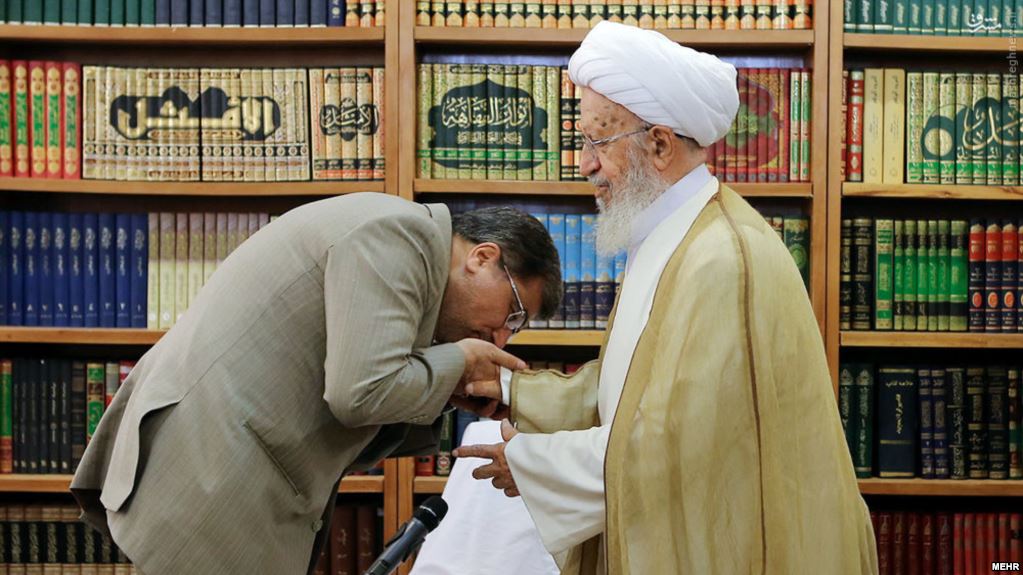
On International Anti-corruption Day, US Department of State published tweets in its account with regard to the wealth of Iranian rulers and corruption of Islamic Republic government. In these tweets, US State Department pointed to the wealth of Islamic Republic’s rulers.
In a tweet about Iranian supreme leader Ali Khamenei, US State Department said: ‘Today is Anti-Corruption Day. Sadly, for the Iranian people, their government is full of corrupt hypocrites. Take Ayatollah Khamenei, who has a tax-free hedge fund worth billion. This so-called holy man devours property from religious minorities, then funnels the cash to IRGC.’
The other tweet slams Makarem Shirazi: ‘Unfortunately, Anti-Corruption Day is a reminder for Iranians that their government is full of corrupt hypocrites. Meet Grand Ayatollah Makarem Shirazi – The Sultan of Sugar. He made millions flooding the market with expensive imported sugar, putting Iranians out of work.’
Nasser Makarem Shirazi, a grand ayatollah in Qom, is known as Sultan of Sugar due to his involvement in sugar trade. Previously US Secretary of State had said about Makarem Shirazi that ‘he has generated $100 million for himself in illicit trade of sugar.’
In another tweet, US State Department wrote: ‘This Anti-Corruption Day Iranians have much to despair about. Their government is full of corrupt hypocrites. Meet Sadegh Mahsouli – The Billionaire General. Somehow he had a knack for winning lucrative construction and oil contracts from IRGC businesses. He is now worth billions.
December 9 is called International Anti-Corruption Day by the United Nation. On this day, countries of the world are asked to take measures in this regard.
VOA Persian – December 10
Sadegh Larijani: Protests in France are Continuance of Wave of Islamic Awakening
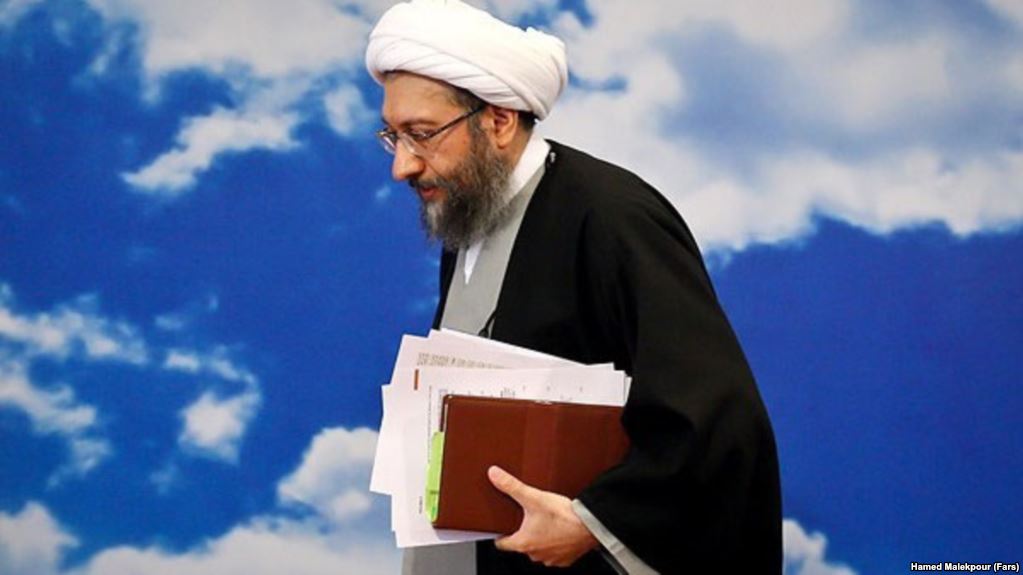
Iran’ Chief Justice Sadegh Amoli Larijani claimed that recent protests in France had been predicted by Ali Khamenei, saying that they are in continuation of ‘wave of Islamic awakening’. On Monday December 10, Larijani pointed out to recent protests in France, asserting that leader of Islamic Republic had foretold years ago that ‘the wave of Islamic awakening will not be confined to Islamic countries, and will go to Europe as well.’
Sadegh Larijani also advised the leaders of European countries to ‘show self-restraint to people’, saying during December protests last year, ‘officials of the western countries, including France, made an uproar and kept expressing worries in this regard.’
It must be mentioned that Iranian establishment has a long record of violent confrontation with any kinds of popular protests. For example, during December protests in Iran in 2018, more than 20 people were killed, and one thousand people were arrested, some of whom were sentenced to long imprisonment. A few days ago, students’ union councils issued a statement on occasion of Students’ Day, saying that during last year, more than 300 students have been arrested for taking part in these protests, and the sentences issued for students amount to more than 100 years of imprisonment.
Some other former officials of Islamic Republic have reacted to the recent protests in France as well. In most recent case, former President Mahmoud Ahmadinejad addressed France’s officials, saying: ‘listen to your people’s demands’. Bahram Ghassemi, Iranian Foreign Ministry’s spokesperson, too, had asked French police to show “self-restraint” against the protesters. Mohsen Rezaee, secretary of Expediency Discernment Council, said last week: ‘French people are after an identity that is independent from Europe. If this identity is not retrieved, France too will separate from Europe in next ten years.’
In protest against 2009 disputed presidential election in Iran (Ahmadinejad’s second term), Iranian people peacefully took to streets. Thousands were reportedly arrested, tortured, and many were raped in prisons. There were at least 72 deaths in the three months following the election.
Radio Farda
Rouhani Warns Against Rejection of FATF; Poverty Line Sees 25% Increase in Iran
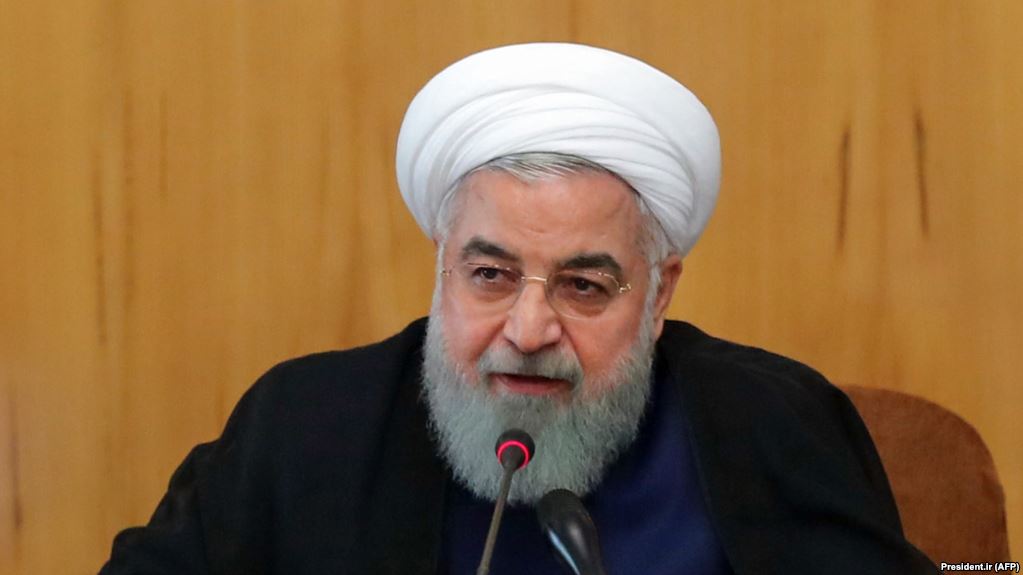
President Hassan Rouhani said that if the FATF (Financial Action Task Force) bills are not approved, it will cost Iran a 20% rise in its financial transactions. Rouhani added people should know how much it costs them if Iran refuses to join FATF or exit JCPOA. He also said people’s opinion in this regard should be asked.
Iran’s President, in a meeting with directors at Ministry of Roads and Urban Development, pointed out that foreign banks will not cooperate with Iran if FATF bills are not ratified. “Therefore, Iran’s financial transactions will be done via Forex shops which will cost 20% more”, asserted Rouhani. He also noted those who talk against FATF do not explain the impact of their slogans or pay the price for them.
In the meantime, according to a report by Iranian parliament’s Research Center, the absolute poverty line has had a 25 percent increase this summer in the country, compared to the same time last year. Given the inflation rate, especially rising prices of food, poverty line will even rise more by the end of this year, says the report.
Poverty line in Tehran has increased around 300 thousand tomans for a family of four during this summer in comparison to spring. The report also warns against the government policies regarding increase of wages throughout the year, calling it “non-purposeful.” A considerable rise in workers’ wages in the areas with lower poverty line might lead to their dismissal as it imposes extra expenses on their employers, asserts the report.
It must be noted that workers of Iran National Steel Industrial Group staged a protest assembly in southern city of Ahvaz. The workers wore shrouds and held their assembly in front of the office of representative of supreme leader Ali Khamenei in Ahvaz, criticizing inflation and chanting slogans against President Rouhani, calling him a “liar”. The workers of Iran National Steel Industrial Group have been on strike for more than a month in protest to “unpaid wages” and “indifference of factory managers in providing basic materials for production.”
Peike Iran—December 10
Radio Farda
Worker Protesters in Iran Relate to Yellow Vests in France
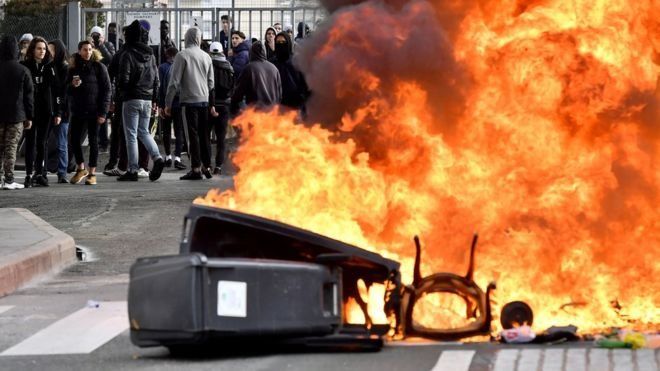
As the economic situation keeps deteriorating in Iran, the workers of Iran National Steel Industrial Group continued to stage demonstrations in southern city of Ahvaz while holding placards with references to France’s ‘Yellow Vests’ protests. While chanting “Inflation, High Prices; Be Accountable, Rouhani!”, workers held placards which said, “The government is urinating on our lives, but the media says it’s raining.”
Based on a report by Free Union of Iranian Workers, one of the workers of Iran National Steel Industrial Group was arrested on Tuesday. Meysam Al Mehdi was taken into custody and transferred to an unknown place by security forces. Moreover, a number of worker activists in Tehran held an assembly in front of Iran’s parliament in solidarity with workers of Haft Tapeh Sugarcane Factory and Iran National Steel Industrial Group.
According to a report published by U.S. Department of State, global organizations have repeatedly condemned Iran for its treatment of workers. For instance, the International Labor Organization designated Iran among its “cases of serious failure” in its 2017 General Report. Also, the International Trade Union Confederation ranked Iran in the lowest category– “no guarantee of rights” — in its 2018 Global Rights Index.
BBC Persian—December 11
500 Student Activists: Sound of Military Boots Can be Heard Throughout Country
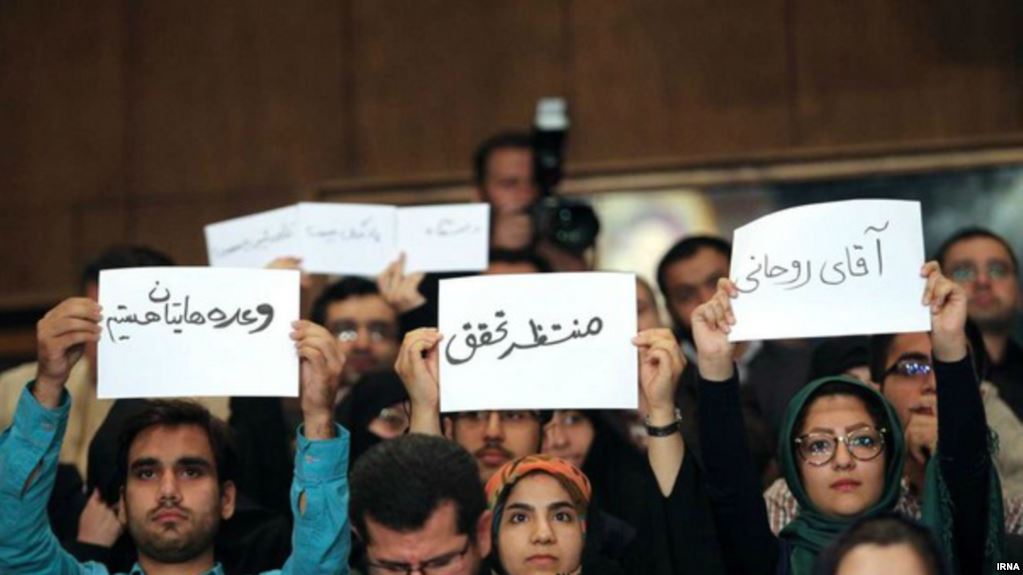
Even though Iranian President Hassan Rouhani has called Iranian universities as freest in the world, more than 500 student activists, in an open letter to him, protested against widespread ‘crackdown’ on universities and all over the country, security entities suppressing students and crackdown on other groups including workers, teachers and dervishes.
Students’ union councils, meanwhile, announced in a statement on the occasion of Students’ Day in Iran that during last year, more than 300 students have been detained throughout the country, and students were given heavy sentences including imprisonment, flogging and being banned from leaving the country. According to Ensaf news, student activists wrote to Hassan Rouhani in this letter that law enforcement forces, Intelligence Ministry and Interior Ministry ‘in an unfortunate rivalry with parallel security entities’ are unanimously trying to crackdown on protesting voices and ‘you, of course, just keep denying it’.
These student activists, pointing out to similar protest letters in the past, asserted that such letters were not only left unanswered, but ‘crackdown became more and more widespread; to the extent that today the sound of military boots can be heard not just in universities but all over the country’.
A footage of the ceremony of Students’ Day in Tabriz University shows a student slamming the Iranian establishment for not creating freedom in the university, saying: ‘It is the 40th anniversary of the revolution. If during past 40 years, you couldn’t create freedom in the university which founded the revolution, you will not be able to do so in next 40 years.’
During widespread protests in December 2017, 150 to 200 students were arrested in Iran – mostly in Tehran. 17 students received heavy sentences of 5 to 8 years imprisonment. They were arrested for activities in universities’ union councils, criticizing privatization and gender discriminations, and trying to link students’ activities with workers’ protests. Intelligence Ministry called arresting tens of students during those protests as a ‘preemptive measure’
Radio Farda
Deutche Welle
Rouhani Warns the West about Consequences of Sanctions Against Iran
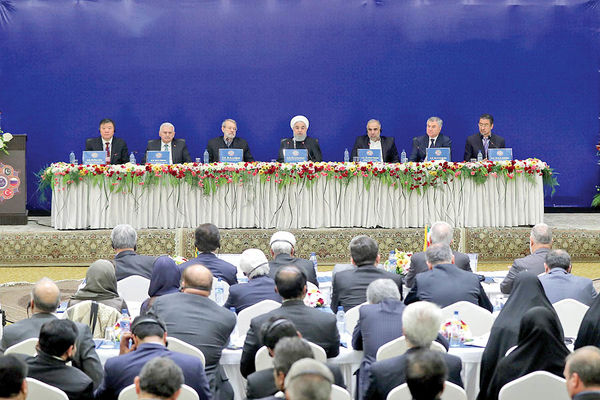
Iranian President Hassan Rouhani warned the West against the consequences of its extensive sanctions against Iran, saying “If our abilities in fighting drugs and terrorism in their origins are weakened, you will not be able to survive the ruins of narcotic drugs, refugees and bombs and assassination.”
In his speech in anti-terrorism conference attended by parliamentary speakers from Iran, Afghanistan, Pakistan, Turkey, China and Russia, Rouhani added that “we don’t expect the West to pay their shares for the security and stability that we have provided for them, but they must know that with putting sanctions on Iran, they are damaging our capabilities to fight narcotic drugs and terrorism.”
Hassan Rouhani maintained that Iran has spent millions of dollars on the fight against drug trafficking and terrorism and has “made an obstacle for dealers of violence.” He added, “Just imagine what a catastrophe takes place if there is a hole in that obstacle.”
In this speech, Hassan Rouhani also accused President Donald Trump of “economic terrorism” for re-imposing sanctions on Iran, saying “The illegal, cruel economic sanctions imposed by US has targeted our nation in an obvious form of terrorism.”
Reiterating Rouhani’s warning, hardline MP Naqavi Hosseini, member of Parliament’s National Security and Foreign Policy Commission, urged that with continuation of the sanctions, “we will decide on whether to fight terrorist groups,” emphasizing on Iran’s heavy cost in fighting terrorism and drug trafficking.
Donya-e eqtesad—December 8
ISNA
Twofold Increase in Iran’s Missile Tests in 2018
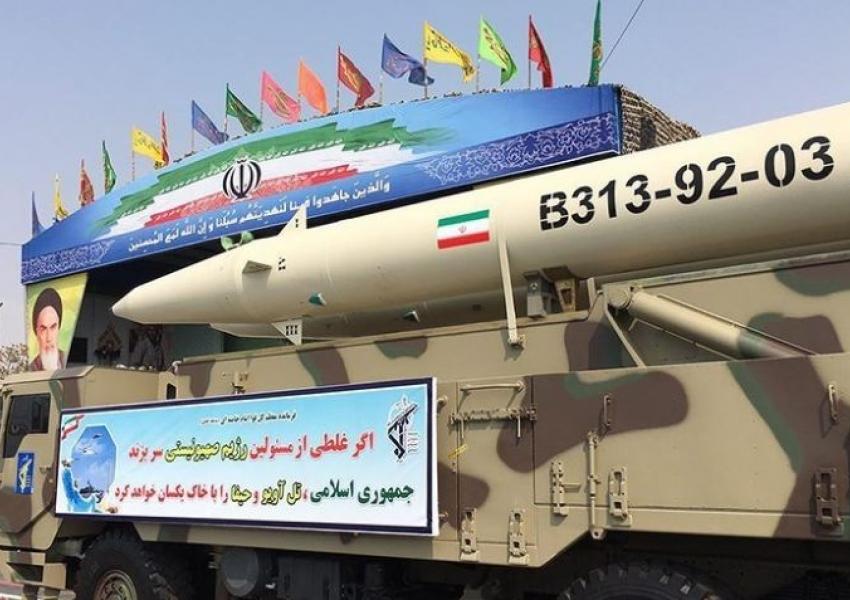
According to a German newspaper, the number of missile tests by Islamic Republic of Iran has doubled in 2018. German newspaper Welt am Sonntag has reported that Islamic Republic has tested seven mid-range missiles, and five short-range and cruise missiles in 2018 – 12 missile tests that, according to this newspaper, has become twice as many as Islamic Republic’s missile tests in 2017. Welt am Sonntag wrote that Iran had tested 4 mid-range missiles and short-range missile in 2017.
According to this report, Iran’s current mid-range missiles – with 2000km range – can target Saudi Arabia and any location in Israel; they can also reach European Union.
Brigadier-General Hajizadeh said that Iran has no ‘technical or contract limitations’ for increasing the range of its missiles to more than 2000km. In his talk in Science and Technology University, he said that Islamic Republic is capable of making missiles with ranges higher than 2000km.
Even though Iran claims that its missile program is defensive, its missile program has been criticized by America and the West for years. Western countries believe that Iran’s missile program is basically for threatening Israel and aims at producing missiles capable of carrying nuclear warheads.
In recent weeks, western officials have accused Iran of conducting a missile test, violating UNSC 2231 which bans Iran from testing and using ballistic missiles capable of carrying nuclear warhead. The test also faced with negative reaction of France and Britain.
In this regard, Iranian Foreign Minister Mohammad Javad Zarif says the issue of missiles was never a topic of negotiations, and the United Nations Security Council Resolution 2231 has not prohibited Iran’s missile activities. Iran’s Foreign Minister made those comments after the commander of Aerospace Forces of Islamic Revolutionary Guards Corps Brigadier General Amir Ali Hajizadeh declared Iran had recently carried out a missile test.
Iran International
Tasnim news agency
10 Arrested After Chabahar Terrorist Attack
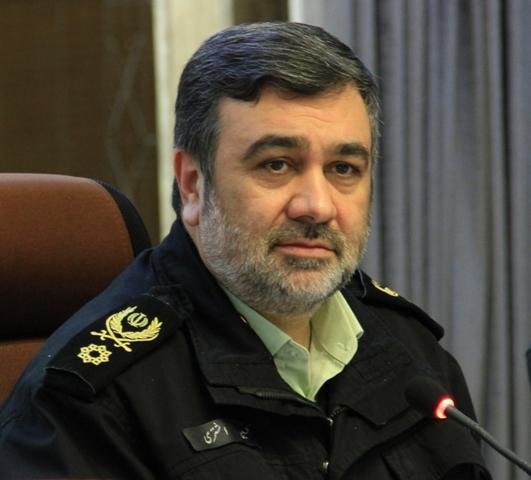
Iranian police commander Hossein Ashtari announced that so far 10 individuals have been identified and taken into custody with regard to the terrorist attack in southeastern city of Chabahar. Ashtari added the rest of those responsible for the attack will be arrested “over time.” He did not reveal any details about the detained individuals. Ashtari called the attack a “conspiracy” which was “neutralized” by police.
On December 6, a suicide car bombing in the port city of Chabahar in Sistan and Baluchistan province left several dead and injured. During this attack, a car was exploded in front of the police headquarters in Chabahar. The security deputy of Sistan and Baluchistan province announced three were killed, including two police officers and the suicide bomber, and many were wounded.
A number of news websites reported at the time that the armed group known as Ansar al-Furqan claimed responsibility for the attack. Ansar al-Furqan is a splinter group of Jundallah that has carried out several explosion operations in Iran.
ISNA—December 9
